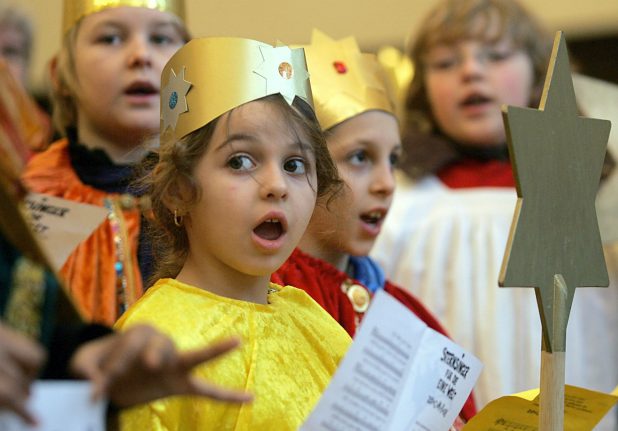I started working at a bilingual kindergarten in Munich in 2009 where my German co-teacher loved to sing as much as I loved to listen. She opened my ears to some of the most melodious and famous German songs.
Once these ditties entered my ears, they stubbornly refused to leave. They were so devastatingly melodious that they wrung tears out of my eyes. They gripped me with a sweet pain, touched my soul and made me feel strangely incomplete when I didn't hear them.
I sang them in crowded market squares, hummed them in noisy U-Bahn stations when no one would hear me, and whistled them like a lark who had forgotten how to stop singing.
When I sang Leise rieselt der Schnee (Quietly flutters the snow) or Schneeflockchen, Weißröckchen (Little snow flake, little white dress), I didn't care if it was winter or summer. I didn't wait for Christmas to sing Kling, Glöckchen (Ring, little bell) or in der Weihnachtsbäckerei (In the Christmas bakery).
The love affair that began is as strong now as if it just started yesterday. I have never been able to get past children's songs to move on to other genres.
There's a reason it's easy to fall in love with deutsche Kinderlieder – Germany has been home to some of the most renowned composers, producers and performers in the world. It is the largest music market in Europe, and the third largest in the whole world.
German composers include some of the most accomplished and popular in history, among them Johann Sebastian Bach, Ludwig van Beethoven, and Franz Schubert.
This lends a remarkable aura to a seemingly small thing like a children's song. These songs are a fine form of poetry, have deep philosophical meaning and nostalgic melodies that are impossible to find elsewhere.
Consider this line from a canon by 19th century composer August Mühling: Froh zu sein bedarf es wenig und wer froh ist, ist ein König! (It takes very little to be happy, and whoever is happy is a king!). Where else can one find such a pearl of wisdom in a song for children? Germany is the land where babies and young ones still fall asleep to Beethoven and Mozart.
Most of the current popular children's songs were written down during the 19th century. August Heinrich Hoffmann von Fallersleben alone is said to have penned more than 500 of them.
Some of his famous songs that every German child knows are Alle Vögel sind schon da (All the birds are already there), Ein Männlein steht im Walde (A man stands in the forest) and the Christmas song Morgen kommt der Weihnachtsmann (Father Christmas is coming tomorrow).
Children in Germany have songs for every occasion and every reason you can possibly think of. They have songs for Easter, for Christmas, for baby Jesus, for New Year, for Nikolaus, for the weather, for birthdays, for animals and for fruit, just to name a few. If you dropped your hat, they probably have a song for that too.
What I admire most is how one can travel the length and breadth of the country and the children learn and sing the same Easter, St. Martin's or Nikolaus songs. These lyrics act like a thread that ties Germany together.
You might not realize it, but some famous English Christmas carols are actually translations of original German Weihnachtslieder (Christmas songs).
The beautiful “Silent Night” was first the German Stille Nacht, neilige Nacht, written by Joseph Mohr, and set to music by Franz Xaver Gruber in 1818.
Similarly, “O Christmas Tree” is a direct translation of O Tannenbaum, which was originally a German folk song.
Interestingly, there are also German versions of many popular English kindergarten songs like “Wheels on the bus” and “If you’re happy and you know it”, as well as songs for entire fairy tales like Sleeping Beauty and Hansel and Gretel.
I can only say that learning about German culture is incomplete without learning about its rich musical heritage. Similarly, talking about music is incomplete without an honorable mention of German rhyme and rhythm.
But more than that, for anyone who loves music, German children’s songs are a must. At any rate, German Kinderlieder have found a permanent place in my heart. Neither my festivals, nor seasons, nor my day-to-day kindergarten life would be complete without them.
Ratna Srivastava blogs at The Sun in my Cup, and you can visit her Facebook page here.
For all The Local's guides to learning German CLICK HERE


.jpg)

 Please whitelist us to continue reading.
Please whitelist us to continue reading.
Member comments